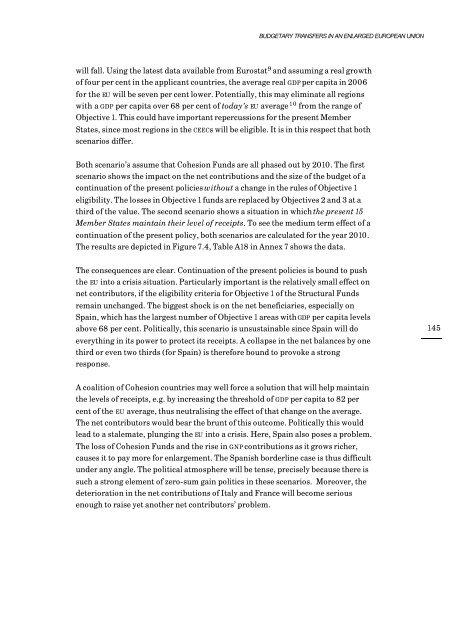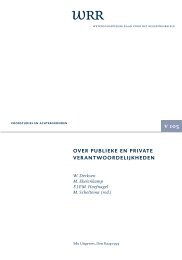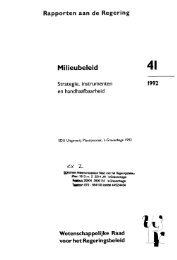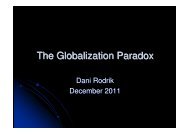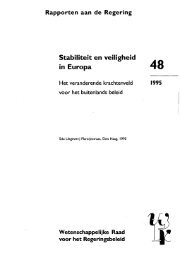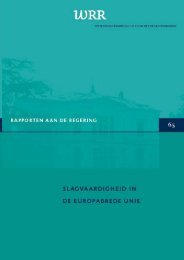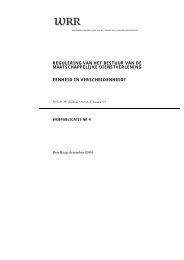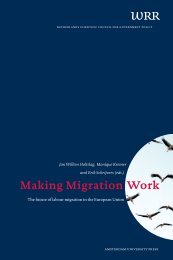w 109 long-run economic aspects of the european union's eastern ...
w 109 long-run economic aspects of the european union's eastern ...
w 109 long-run economic aspects of the european union's eastern ...
Create successful ePaper yourself
Turn your PDF publications into a flip-book with our unique Google optimized e-Paper software.
BUDGETARY TRANSFERS IN AN ENLARGED EUROPEAN UNIONwill fall. Using <strong>the</strong> latest data available from Eurostat 9 and assuming a real growth<strong>of</strong> four per cent in <strong>the</strong> applicant countries, <strong>the</strong> average real GDP per capita in 2006for <strong>the</strong> EU will be seven per cent lower. Potentially, this may eliminate all regionswith a GDP per capita over 68 per cent <strong>of</strong> today’s EU average 10 from <strong>the</strong> range <strong>of</strong>Objective 1. This could have important repercussions for <strong>the</strong> present MemberStates, since most regions in <strong>the</strong> CEECs will be eligible. It is in this respect that bothscenarios differ.Both scenario’s assume that Cohesion Funds are all phased out by 2010. The firstscenario shows <strong>the</strong> impact on <strong>the</strong> net contributions and <strong>the</strong> size <strong>of</strong> <strong>the</strong> budget <strong>of</strong> acontinuation <strong>of</strong> <strong>the</strong> present policies without a change in <strong>the</strong> rules <strong>of</strong> Objective 1eligibility. The losses in Objective 1 funds are replaced by Objectives 2 and 3 at athird <strong>of</strong> <strong>the</strong> value. The second scenario shows a situation in which <strong>the</strong> present 15Member States maintain <strong>the</strong>ir level <strong>of</strong> receipts. To see <strong>the</strong> medium term effect <strong>of</strong> acontinuation <strong>of</strong> <strong>the</strong> present policy, both scenarios are calculated for <strong>the</strong> year 2010.The results are depicted in Figure 7.4, Table A18 in Annex 7 shows <strong>the</strong> data.The consequences are clear. Continuation <strong>of</strong> <strong>the</strong> present policies is bound to push<strong>the</strong> EU into a crisis situation. Particularly important is <strong>the</strong> relatively small effect onnet contributors, if <strong>the</strong> eligibility criteria for Objective 1 <strong>of</strong> <strong>the</strong> Structural Fundsremain unchanged. The biggest shock is on <strong>the</strong> net beneficiaries, especially onSpain, which has <strong>the</strong> largest number <strong>of</strong> Objective 1 areas with GDP per capita levelsabove 68 per cent. Politically, this scenario is unsustainable since Spain will doeverything in its power to protect its receipts. A collapse in <strong>the</strong> net balances by onethird or even two thirds (for Spain) is <strong>the</strong>refore bound to provoke a strongresponse.145A coalition <strong>of</strong> Cohesion countries may well force a solution that will help maintain<strong>the</strong> levels <strong>of</strong> receipts, e.g. by increasing <strong>the</strong> threshold <strong>of</strong> GDP per capita to 82 percent <strong>of</strong> <strong>the</strong> EU average, thus neutralising <strong>the</strong> effect <strong>of</strong> that change on <strong>the</strong> average.The net contributors would bear <strong>the</strong> b<strong>run</strong>t <strong>of</strong> this outcome. Politically this wouldlead to a stalemate, plunging <strong>the</strong> EU into a crisis. Here, Spain also poses a problem.The loss <strong>of</strong> Cohesion Funds and <strong>the</strong> rise in GNP contributions as it grows richer,causes it to pay more for enlargement. The Spanish borderline case is thus difficultunder any angle. The political atmosphere will be tense, precisely because <strong>the</strong>re issuch a strong element <strong>of</strong> zero-sum gain politics in <strong>the</strong>se scenarios. Moreover, <strong>the</strong>deterioration in <strong>the</strong> net contributions <strong>of</strong> Italy and France will become seriousenough to raise yet ano<strong>the</strong>r net contributors’ problem.


